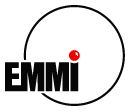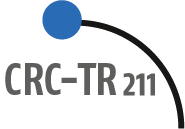Organizers: Michael Buballa, Fabian Rennecke, Nicolas Wink
E-mail: funscs@theorie.ikp.physik.tu-darmstadt.de
Topics Covered
- Phases of strongly correlated systems
- Dynamics of strongly correlated systems
- Bound states and resonances in strongly correlated systems
Speakers and participants
Scientific case
Strong correlations give rise to a rich variety of phenomena across different subfields of physics. These range from ultracold atoms near the unitarity limit and high-temperature superconductivity in condensed matter systems to the quark-gluon plasma created in heavy-ion collisions and dense nuclear matter inside neutron stars. Experimentally, these phenomena are probed in novel materials such as Moiré heterostructures, through multi-messenger astronomy and in ultra-relativistic heavy-ion collisions. In particular with the imminent completion of facilities such as FAIR, a detailed understanding of strongly correlated matter at finite density is imperative. To this end, this workshops aims to explore potential synergies between different subfields of physics.
The cross-fertilization between condensed matter and nuclear physics has a rich history, with the discovery of spontaneous symmetry breaking as a prime example. In the new era of multi-messenger astronomy, initiated by the direct measurement of gravitational waves from neutron star mergers, and the substantial activity in lower-energy heavy-ion collisions at RHIC, LHC, HADES, FAIR and others, the promising connections between these different fields become most apparent. Dense QCD matter shares many similarities with condensed matter systems. Not only critical points, inhomogeneous/crystalline and superconducting phases emerge in both cases, but the methods to theoretically study them are also largely the same.
Strong correlations give rise to non-perturbative phenomena. In addition, sign problems arise at finite density and in non-equilibrium situations. Hence, non-perturbative functional continuum methods, such as the Functional Renormalization Group (FRG), Dyson-Schwinger Equations (DSE) and n-Particle Irreducible (nPI) approaches, are essential tools to make progress. Recent developments have pushed the boundaries of what can be achieved using these methods, and it is time to review this progress and discuss future prospects.
This workshop will revolve around three main topics that are necessary for a detailed understanding of strongly correlated systems: their phase structure, real-time dynamics and emerging bound states. The equilibrium properties of these systems are controlled by the equation of state, which is determined by the phase structure. Through different bound states and condensates that can emerge in different phases, the systems can be characterized in an experimentally accessible way. However, real-time properties such as spectral and other response functions of these bound states are typically required for a full characterization. In addition, in many relevant cases strongly correlated systems are out of equilibrium, so understanding their dynamics is indispensable.
Organizational information
The workshop takes place at the Darmstädter Haus, which we have reserved from Sunday, September 10, late afternoon
until Friday, September 15 in the afternoon.
Program
General structure:- Sunday, September 10: arrival and reception
- Monday, September 11 - September 15: invited talks and selected contributions
- Friday, September 15: departure after breakfast
Registration
The registration is closed.
There is no registration fee.
Further information is given on this website.


